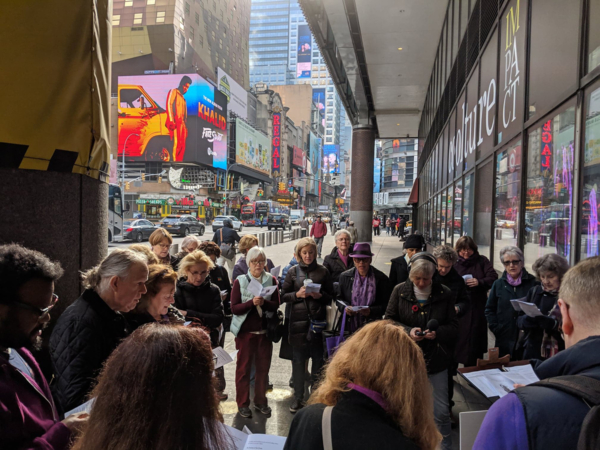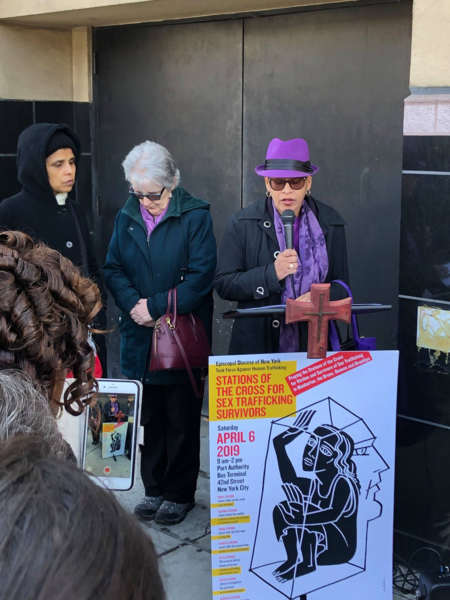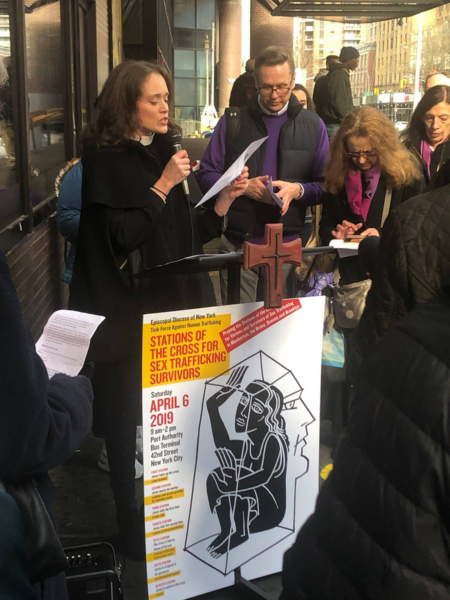Stations of the Cross for Sex Trafficking Survivors takes the burden from victimsPosted Apr 18, 2019 |
|

The Port Authority Bus Terminal served as the first station on April 6 for Stations of the Cross for Sex Trafficking Survivors, an event of the Episcopal Diocese of New York Task Force Against Human Trafficking. Photo: ENS
[Episcopal News Service] On the morning of April 6, the Port Authority Bus Terminal in New York City became more than a transit hub – it became a site of prayer and activism that connected the Stations of the Cross to the plight of sex trafficking victims.
“The cross is a metaphor for sex trafficking,” said the Rev. Adrian Dannhauser, associate rector at Manhattan’s Church of the Incarnation and chair of the Episcopal Diocese of New York Task Force Against Human Trafficking. Sex trafficking victims often face continued violence, social stigma and a loss of agency in an unsupportive system.
Dannhauser and a group of some 30 faith-based activists – many of whom wore various hues of purple in support of sex trafficking victims and in recognition of Lent – gathered for a traveling model of the Lenten tradition, which connected the Stations of the Cross to elements of sex trafficking throughout New York City.
Praying the Stations of the Cross during Lent is a centuries-old tradition that focuses Christians on the path of suffering that Jesus followed to his ultimate sacrifice on the cross, and for many Christians, that story is retold in solemn tones inside the walls of a church or chapel.
Organized by the Episcopal Diocese of New York Task Force Against Human Trafficking, Stations of the Cross for Sex Trafficking Survivors followed seven stations, abbreviated from the usual 14, across three of the city’s boroughs. Each stop reflected Jesus’ journey on Good Friday and the burden of commercial sexual exploitation, featuring opening devotion and liturgy from faith leaders, as well as speeches from trafficking survivors. Attendees visited a shelter and service provider for homeless youth, a strip club, an area of the Bronx known for street prostitution, a human trafficking intervention court in Queens, John F. Kennedy International Airport and a hotel in Brooklyn known for commercial sex.
Fittingly, the Port Authority Bus Terminal served as the first station. Located just blocks from Times Square, the Port Authority is the nation’s largest and busiest bus terminal. It’s open 24 hours a day and, because of its location in a tourist district and its nearly 200,000 daily visitors, the terminal has long been a hot spot for traffickers, pimps and others who scout for vulnerable women to coerce into prostitution.

Yvonne O’Neal, a member of the Diocese of New York Task Force Against Human Trafficking, leads a prayer at the third station. Photo: Lynnaia Main via Facebook
“This was the most profound experience I’ve had this Lent. Hearing from survivors of sex trafficking who, after such suffering and degradation, have resurrected into a new life of service and advocacy, women who have found their voice and are now empowered to help others. The prayers were very moving. I led at the third station and at the last. The suffering of Jesus felt real on this day,” said Yvonne O’Neal, a member of the New York diocese’s task force and The Episcopal Church’s representative on the United Nations NGO Committee to Stop Trafficking in Persons.
“Sex trafficking is on the increase. I wonder who among us in the pews on Sunday mornings are the johns in this horrific industry. Are they listening to the message of Jesus Christ? The Diocesan Task Force Against Human Trafficking is bringing awareness to this scourge throughout the diocese. I want us to talk about this evil from the pulpit – our priests should not be afraid to address these hard issues of various forms of interpersonal violence.”
Kevin Booker, who recently became a member of St. James’ Episcopal Church in Manhattan, said he attended the event to learn more about the Stations of the Cross and ways he could help combat sex trafficking.
“The mechanisms of sex trafficking in the city are insidious and surround us on a day-to-day basis, and we’re not really aware of it,” he said. “If I can pray my way into the situation, into awareness about it and be around people who are really motivated to do something … this event, in a strong way, feels like an answer to prayer.”
Sex trafficking involves coercing, tricking or otherwise forcing people (mostly women, and often women of color, and children) into prostitution. New York is in the midst of a trafficking epidemic, according to the New York Post, and police, task forces, faith groups and other activists have been working to combat this multilayered issue. Jim Klein, New York Police Department Vice Enforcement Unit inspector, told AM New York that his team has found 12-year-old girls and 35-year-old women working as prostitutes, some of whom are forced to have sex 25 to 30 times a day.
At Covenant House, a youth homeless shelter that served as the event’s second stop and proxy for the fourth station where Jesus meets his mother, approximately 23 percent of clients have been commercially sexually exploited, said Covenant House New York Executive Director Sister Nancy Downing. “We witness how the life, dignity, hope and dreams of hundreds of young people are stripped of them by sexual predators,” she said, noting that the issue of sexual exploitation goes far beyond New York City.
Covenant House operates in 31 cities across six countries in the United States and Latin America, serving more than 80,000 youth.
“Imagine 23 percent of 80,000 young people,” said Downing.
In 2017, the NYPD rescued one person a week from sex slavery and arrested 228 pimps while working 265 sex trafficking cases, the Post reported – more than twice the case load of 2016. “Trafficking is a bigger problem than what the numbers show,” Klein told the Post. “On average, a pimp is going to have at least four or five women, girls, that he’s going to be working. [And] I haven’t locked up every pimp.” Many of those victims are from New York, recruited in their neighborhoods or online.
Among the survivors participating in the event was Gigi Phoenix, who came to New York at age 18 and was recruited at Port Authority terminal by a pimp who coerced her into sex and drug use. Outside JFK airport (the sixth stop and 10th station), Shandra Woworuntu, an Indonesian survivor-advocate, discussed how she was stripped of agency and the American dream, much like Jesus was stripped of his garments.

The Rev. Adrian Dannhauser is associate rector at Manhattan’s Church of the Incarnation and chair of the Diocese of New York Task Force Against Human Trafficking, which organized the April 6 Stations of the Cross for Sex Trafficking Survivors. Photo: Lynnaia Main via Facebook
“He made you carry a cross you could not bear,” Dannhauser told Phoenix, reflecting on the story of many trafficking victims. “We pray for victims who remain entrapped and enslaved in the sex trade. … We hope to instill in them a sense of self-worth that will allow them to seek hope.”
While the Stations of the Cross event served to lift spirits and convene community through prayer, it also marked the beginning of a campaign against a controversial proposal to decriminalize sex work in New York state. In an open letter to the New York Daily News, newly elected state Senators Julia Salazar and Jessica Ramos said their bill would “repeal statutes that criminalize consensual sexual exchange between adults and create a system that erases prostitution records for sex workers and sex trafficking survivors so they can move on with their lives.”
Under New York’s current penal code, immigrants, women of color, trans women and LGBTQ youth bear the burden of laws supposedly designed to protect them, the state senators said. “People arrested for prostitution are then diverted to the Human Trafficking Intervention Courts, or HTICs, which conflate all sex work with sex trafficking and claim to treat sex workers as ‘victims’ while essentially treating them as ‘criminals,’” the letter continued. Anti-trafficking advocacy organization Polaris gave New York state a “D” on its criminal record relief report card.
Yet on the steps of one such court in the borough of Queens, faith leaders and attendees admonished the decriminalization proposal. Victims of sex trafficking should not be criminalized for their victimhood, they concurred, but traffickers and sex buyers should be.
“Prostitution and trafficking are violent trades; there is no such thing as safe prostitution. That’s why it’s so hard to fathom that we have legislators looking to decriminalize the violent, harmful disease-ridden, trauma-laced sex trade,” said the Rev. Que English, a senior pastor at the Bronx Christian Fellowship, CEO and founder of Not On My Watch NYC, and convener of TrafficK-Free NYC. English called the decriminalization proposal a “demonic dark bill in the making” and cautioned that it would lead to legal brothels that view pimps as entrepreneurs.
“These efforts are being built on discriminatory practices, built on the backs of predominately black and brown communities and the most vulnerable among us,” she continued. “These legal brothels … will not be on Fifth Avenue, they’re not going to be on Park Avenue, they will not be in Country Club or Riverdale. They will be where we find massage parlors and liquor stores on every corner, in our poorest districts, while the buyers will continue to come from the other side.”
Despite their differences, those on both sides of the decriminalization debate have inherently Christian desires: to act in good faith and provide services to people in need. Both English and the bill authors advocate for more education and early intervention for vulnerable children 11-15 years old, as well as employment services, healthcare and comprehensive service-enriched housing.
“Politicians … are supposed to serve us through the policies they make. Our coming here is our way of praying with our feet,” said Pastor James Osei-Kofi of Bethesda Healing Center in Brooklyn. “Let’s pray for our politicians – local state and federal – that God will give them the boldness, the compassion, and the passion to do what they need to do.”

Social Menu